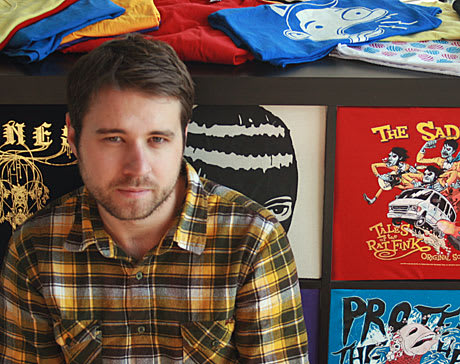Third Estate (a href="http://www.third-estate.com" target="_blank">www.third-estate.com) is a full-service music merchandising company based in Toronto. Services include product development, manufacturing, and online storefronts, aimed at supporting the merchandising goals of artists and independent record labels.
Why go with a company rather than manage your own merch production?
A lot of the smaller indie bands will print their own merch. With a company it's all about being able to restock quickly, and getting advice on how to get the most for their money. We will help bands devise a strategy and possibly projections for tours if there is enough data on hand, and then we help advise on designs and price points, all the way through to doing the design if that's necessary, although most clients will bring their own designs. We print the merchandise or source it if they want belt buckles or flasks and things like that, and then we look after the logistics, make sure it's at the venue on time, which save saves on shipping if they are doing a cross-Canada tour by shipping in thirds or in halves. Then we provide a place to leave the stuff after a show, to sell online. Oftentimes kids might go to a show and not have enough money to buy both the CD and the t-shirt, so this gives them a chance to pick it up very quickly.
What do you think is the relationship between the increased focus on merch and the overall state of the music business?
In part the focus on merch is based on the decline of other revenues, or the margins on other revenues. The other thing is the control. Aside from very large acts who are signed into merch deals (and I'm not a fan of that), artists can come to us and talk to us about the number of units, and it's a very transparent process. Band should have a lot of control over the expenditure. It's a lot easier for them to see where the return is going to be, and how to maximize the return, when they take control of the opportunity.
Any issues taking a box of shirts across the border?
If you're going across the border with a truck full of merch, I would encourage you to find a broker who can move it for you. Garments are one of the top five things that are most difficult to bring across the Canada-U.S. border along with plants and live animals. Garments are notoriously difficult because, while they do fall under NAFTA, most of them are produced in other countries like Honduras or Malaysia, and so bringing them back and forth there can be tariffs. But I also recommend that you get your merch done domestically wherever you're going. If one of our clients is going into the States, we will have the merch produced in the States and drop-shipped to the venue. The other bonus to that is then you're dealing with the same currency on both sides of cost of goods and retail.
Why go with a company rather than manage your own merch production?
A lot of the smaller indie bands will print their own merch. With a company it's all about being able to restock quickly, and getting advice on how to get the most for their money. We will help bands devise a strategy and possibly projections for tours if there is enough data on hand, and then we help advise on designs and price points, all the way through to doing the design if that's necessary, although most clients will bring their own designs. We print the merchandise or source it if they want belt buckles or flasks and things like that, and then we look after the logistics, make sure it's at the venue on time, which save saves on shipping if they are doing a cross-Canada tour by shipping in thirds or in halves. Then we provide a place to leave the stuff after a show, to sell online. Oftentimes kids might go to a show and not have enough money to buy both the CD and the t-shirt, so this gives them a chance to pick it up very quickly.
What do you think is the relationship between the increased focus on merch and the overall state of the music business?
In part the focus on merch is based on the decline of other revenues, or the margins on other revenues. The other thing is the control. Aside from very large acts who are signed into merch deals (and I'm not a fan of that), artists can come to us and talk to us about the number of units, and it's a very transparent process. Band should have a lot of control over the expenditure. It's a lot easier for them to see where the return is going to be, and how to maximize the return, when they take control of the opportunity.
Any issues taking a box of shirts across the border?
If you're going across the border with a truck full of merch, I would encourage you to find a broker who can move it for you. Garments are one of the top five things that are most difficult to bring across the Canada-U.S. border along with plants and live animals. Garments are notoriously difficult because, while they do fall under NAFTA, most of them are produced in other countries like Honduras or Malaysia, and so bringing them back and forth there can be tariffs. But I also recommend that you get your merch done domestically wherever you're going. If one of our clients is going into the States, we will have the merch produced in the States and drop-shipped to the venue. The other bonus to that is then you're dealing with the same currency on both sides of cost of goods and retail.
